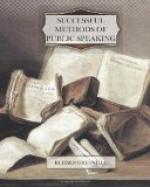“The nation and the name Washington are inseparable. One is linked indissolubly with the other. Both are glorious, both triumphant. Washington lives and will live because of what he did for the exaltation of man, the enthronement of conscience, and the establishment of a Government which recognizes all the governed. And so, too, will the Nation live victorious over all obstacles, adhering to the immortal principles which Washington taught and Lincoln sustained.”
Edward Everett
The following extract from “The Foundation of National Character,” by Edward Everett, is a fine example of patriotic appeal. Read it aloud, and note how the orator speaks with deep feeling and stirs the same feeling in you. This impression is largely due to the simple, sincere, right-onward style of the speaker,—qualities of his own well-known character.
It will amply repay you to read this extract aloud at least once a day for a week or more, so that its superior elements of thought and style may be deeply imprest on your mind.
“How is the spirit of a free people to be formed, and animated, and cheered, but out of the storehouse of its historic recollections? Are we to be eternally ringing the changes upon Marathon and Thermopylae; and going back to read in obscure texts of Greek and Latin, of the exemplars of patriotic virtue?
“I thank God that we can find them nearer home, in our own soil; that strains of the noblest sentiment that ever swelled in the breast of man, are breathing to us out of every page of our country’s history, in the native eloquence of our mother-tongue,—that the colonial and provincial councils of America exhibit to us models of the spirits and character which gave Greece and Rome their name and their praise among nations.
“Here we ought to go for our instruction;—the lesson is plain, it is clear, it is applicable. When we go to ancient history, we are bewildered with the difference of manners and institutions. We are willing to pay our tribute of applause to the memory of Leonidas, who fell nobly for his country in the face of his foe.
“But when we trace him to his home, we are confounded at the reflection, that the same Spartan heroism, to which he sacrificed himself at Thermopylae, would have led him to tear his own child, if it had happened to be a sickly babe,—the very object for which all that is kind and good in man rises up to plead,—from the bosom of his mother, and carry it out to be eaten by the wolves of Taygetus.
“We feel a glow of admiration at the heroism displayed at Marathon by the ten thousand champions of invaded Greece; but we can not forget that the tenth part of the number were slaves, unchained from the workshops and doorposts of their masters, to go and fight the battles of freedom.
“I do not mean that these examples are to destroy the interest with which we read the history of ancient times; they possibly increase that interest by the very contrast they exhibit. But they warn us, if we need the warning, to seek our great practical lessons of patriotism at home; out of the exploits and sacrifices of which our own country is the theater; out of the characters of our own fathers.




